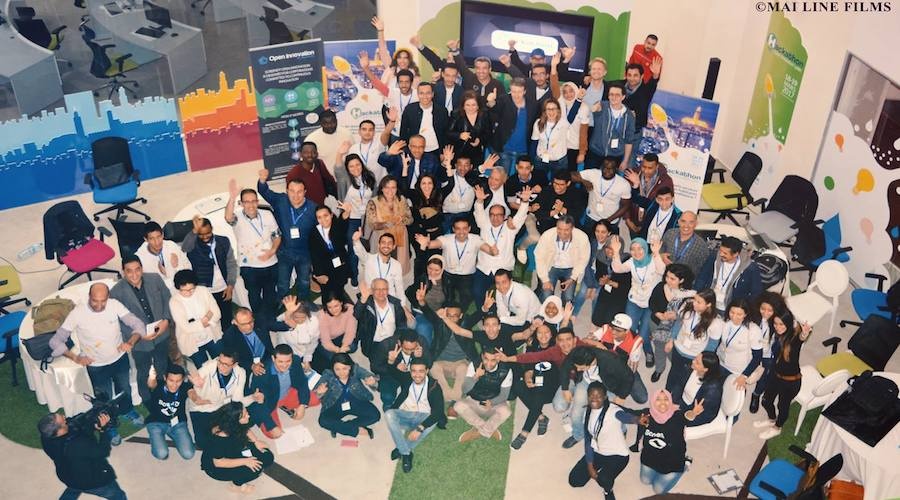Screendy: focusing on product, not customer outreach

What if entrepreneurs no longer needed to look for customers and could just focus on creating the best product for them?
This is what Screendy offers with its Open Innovation program.
The Moroccan startup, which provides a platform for enabling the creation of customized native apps without touching a line of code, has been organizing hackathons for a year now. This approach brings the entrepreneurs and the corporations together to create the products they need.
Organizing hackathons
In December 2015, Mehdi Alaoui, the CEO of Screendy, decided to organize a hackathon in order to obtain feedback from the Moroccan developer community. Alaoui viewed such an experiment as a simple way to test and improve services offered by his startup, which was launched in June 2014.
After not one but seven hackathons, the company received all the feedback it needed. The success of the experiment was such that Screendy decided to make hackathons a permanent feature of its operations.
"It's a very nice way to give back," explained Alaoui, a quiet, discreet serial entrepreneur who is generous with his time.

Anxious to stay focused on Screendy’s other development projects, however, Alaoui decided to create a separate association that would oversee the coordination and implementation of the hackathons. Hack and Pitch was born. It is no longer an issue of testing the platform (the participants are not obliged to use it), but of helping people who have a startup idea to go from the notional stage to developing a minimum viable product (MVP) – in other words, a product that is ready to hit the market.
To accomplish this, the association chaperones the winners after the hackathon by offering them one hour of technical support per week for eight weeks and then putting them in contact with partners to develop their business, integrate accelerators, or raise money.
The association is now managed by four employees. It is financed until the end of 2018 thanks to Screendy, Microsoft, CIH Bank, and INWI. For 2017, the plan is to organize 12 hackathons in Morocco, 10 in the Middle East, and 10 others in Africa.

From hackathon to open innovation
The success of the program attracted the attention of Morocco’s CIH Bank.
The bank was on the lookout for ways in which it might benefit from the spirit of startup innovation. Organizing a hackathon to prototype innovative services or products that meet specific challenges seemed to offer a reliable model, so the bank asked Screendy to tailor a similar program for it.
For three months, Screendy refused to organize such a hackathon-on-demand. The young company needed to focus on its core business.
Yet the perseverance of the bank eventually paid off. And the benefits are there for all to see.
"It's cool, we get paid for it, and we can generate cash that we invest in our R&D, and at the same time the products [developed during the hackathons with Screendy technology] can be put forward. For us, it is an ideal pre-sale tool," explained Alaoui.
A full program
The six-week program begins with a half-day workshop in which startupers, participants, and internal collaborators are introduced to innovation and collaboration between companies and startups.
Participants then plunge into a 36-hour non-stop hackathon. At the end of this marathon, three projects are selected and benefit from a half-day per week of mentoring for a period of three months, so as to facilitate the transition from prototype to MVP.
The program ends with a "demo day" during which the teams present the projects to the top management, which selects one or two to be financed through purchase orders. The teams then have two months to finalize the product and put it into motion.
Big companies want more
Of the five projects awarded at the first hackathons, three made it to the MVP phase and are expected to be presented to top management soon. The contractor is confident that the three will receive orders.
"There are things that have been done that the bank [CIH] could not do in two years," Alaoui boasted.
Screendy has organized similar programs for HPS Solutions and Lydec, and incoming requests from other companies are numerous. So much so that Alaoui had to set limits; Screendy will not organize more than one hackathon per month.

That Screendy’s services are now in such high demand reflects the need for new strategies in the financial technology sector. "Innovation is a real subject, even more so in fintech than elsewhere," observed Alaoui.
Sébastien Slim, head of marketing and innovation at HPS Solutions, agreed: "Our industry is in a state of flux: the fintechs are increasingly [present], regulation forces banks to open their systems. So it was time for us to launch an open innovation program to collaborate and use our ecosystem to design/influence what our future will be."
Slim is delighted with the initial results. "We have already received some positive feedback on what has been proposed but it was also the occasion to meet ‘young talents,’” he explained. One of these "young talents" will now join them for an internship.
The potential impact of these programs on the ecosystem is enormous, because entrepreneurs need not expend as much time and energy on understanding the client, researching the market’s needs, and obtaining financial support.
As a sign of the interest from budding startupers following its last hackathon, Screendy has received 1,000 applications for 28 available slots.
Alaoui, the increasingly ambitious entrepreneur, concluded: "We touched something that will start a fully different dynamic and that will change the situation for entrepreneurship in Morocco.


